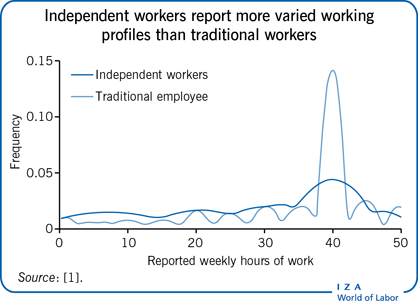Elevator pitch
The number of people holding non-traditional jobs (independent contractors, temporary workers, “gig” workers) has grown steadily as technology increasingly enables short-term labor contracting and fixed employment costs continue to rise. For many firms that need less than a full-time person for short-term work and for many workers who value flexibility this has created a great deal of surplus. During slack economic periods, non-traditional work also serves as an alternative safety net. Non-traditional jobs will continue to become more common, though policy changes could slow or accelerate the trend.
Key findings
Pros
Workers and firms in the independent labor market largely choose independent work because of the flexibility it accords.
The app-enabled gig economy has grown dramatically in recent years, particularly at the low end of the skill distribution.
The gig economy serves as an alternative safety net for some workers in times of economic downturn.
Independent work is a potentially good way for many people to ease into retirement.
Cons
It is very difficult to measure the size of the gig economy (and the independent workforce, more generally).
Non-traditional work imposes risk on workers in terms of fluctuations in income and worry that future “gigs” will not materialize, thereby effectively transferring risk from employers to workers.
Taxation and worker protection policies create both advantages and disadvantages related to traditional vs independent work, which are hard to quantify.
While the value of flexibility might be particularly high for women, women do not make up a disproportionate share of independent workers, and a gender pay gap persists on gig platforms.
